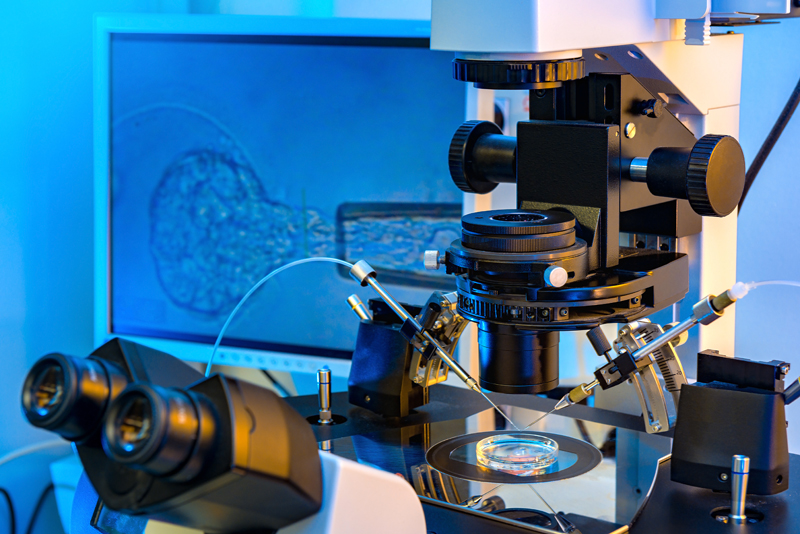Of First Ladies And Test Tube Babies
In recent days, former First Lady Michelle Obama admitted in an interview that she had her daughters through in vitro fertilization (IVF). In this excerpt from her new book Made This Way: How to Prepare Kids to Face Tough Moral Issues, co-author Leila Miller looks at what the Church teaches about IVF.
In Vitro Fertilization (IVF)
Years ago, I was listening to Ron Reagan, Jr. advocate on television for embryonic stem cell research. He was strongly in support of using "excess" human embryos from IVF labs for research material. He caught my attention when he dismissed pro-lifers' objections to human embryo research by noting with a smug chuckle: "Look, if pro-life Christians were really interested in the protection of human embryos, if they really thought those embryos were babies, they'd be against IVF as well.”
Ron thought he was making a clever point, and he was—he just didn't realize the Catholic Church had been making that same point for years: If you care about unborn human life, you must protect it from both the abortionist and the IVF doctor.
Unlike the marital act, IVF creates embryos outside of the woman’s body in a clinic or laboratory. Healthy embryos are later implanted in a woman’s womb, while unhealthy or even unwanted embryonic human beings are destroyed.
Dignitatis Personae points out that IVF “frequently involves the deliberate destruction of embryos,” and that “in any other area of medicine, ordinary professional ethics and the healthcare authorities themselves would never allow a medical procedure which involved such a high number of failures and fatalities” (15).
But even if IVF were performed without destroying “excess” embryos, it would still be wrong, because it separates what God himself has joined: the unitive and procreative purposes of the marital act. Children are thus commodified and exploited, as the CDF explains:
Such fertilization entrusts the life and identity of the embryo into the power of doctors and biologists and establishes the domination of technology over the origin and destiny of the human person. Such a relationship of domination is in itself contrary to the dignity and equality that must be common to parents and children (DP 17).
Unexpected Blessings
I was reading our diocesan newspaper when I saw a feature story about Catholics who had undergone IVF treatments but who now embrace Church teaching. One section profiled two sisters, both of whom had suffered from infertility. One had undergone IVF, and the other had been artificially inseminated. I looked at the large, full-color picture of the two smiling sisters with their beautiful children, and I recognized one of them as a woman from a parish class I taught!
In the article, the woman said that she had gone home shaken from a class at her parish where she had learned that artificial insemination was wrong. But she loved her faith and was prepared to defer to the Church. She later discussed all she had learned with her sister, and they both continued to study the issue. Ultimately, they both came to see the truth of Church teaching, and both women went to confession. They now educate others on the truth as often as they can.
Witnessing our faith to others in this culture is often uncomfortable and even cringe-inducing. Sometimes, we would prefer to crawl into a hole and die rather than speak an unpopular truth to a skeptical or hostile crowd. But if we stay silent, we will never know what good God might have brought about had we spoken. For every ten people who reject what the Church proposes, there may be one who is transformed. And there may be others who initially scoff, but years later put the pieces together.
So, if you ever feel sick to your stomach or embarrassed to share a "hard saying" of our Catholic faith (even to fellow Catholics), please pray and push ahead anyway, speaking the truth in love. God is always ready to honor our feeble efforts!
Did you enjoy this excerpt? Order your copy of Made This Way today!
Recent Posts
-
Medicine for the Soul
When people ask me why they need to go to see a priest in confession instead of going “directly to …Feb 19th 2026 -
What's Right, and What's Wrong—Salvation Hangs In the Balance
The Catholic Church teaches us what actions are gravely sinful and must be avoided so we do not for …Feb 17th 2026 -
Hasty Generalizations and True Scotsmen
No True Scotsman is a type of logical fallacy that involves making exceptions when a claim is contr …Feb 16th 2026










